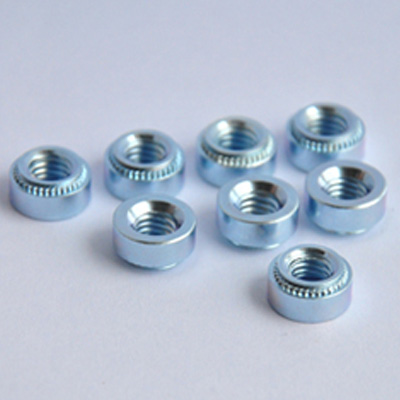self locking nuts, also known as prevailing torque nuts or nylon insert nuts, are a type of self clinching fasteners that feature a nylon insert that locks the nut in place. this is different from a Self Clinching Screws.Self-locking nuts are commonly used in applications that require a high degree of vibration resistance or where the assembly will be exposed to harsh conditions. Here's a closer look at how self-locking nuts are made:
1. Material Selection:The first step in the manufacturing process is selecting the appropriate materials. Self-locking nuts can be made using a variety of materials, including steel, stainless steel, brass, and aluminum. The material selected will depend on the application requirements and the desired performance characteristics of the nut.
2. Hot Forging:The second step in manufacturing self-locking nuts is hot forging. This involves heating a metal blank to a high temperature and then pressing it into the desired shape using a die. This process creates the basic shape of the nut and makes it stronger by aligning the internal grain structure of the material.
3. Threading:After hot forging, the nuts are threaded. The threading process involves rolling or cutting the threads onto the nut's body, which provides the mating feature that screws onto the bolt or stud. The thread pitch and diameter are critical to ensure proper fit and function.
4. Forming:Next, the nylon insert is formed and inserted into the nut. This is done either by molding or by punching the nylon insert into the nut. The insert is designed to provide an interference fit with the threads of the bolt or stud, ensuring that the nut remains locked in place even under high vibration or harsh conditions.
5. Surface Treatment:Depending on the application requirement, self-locking nuts may be coated or treated to improve their corrosion resistance, lubricity, or aesthetics. Surface treatments may include plating, anodizing, or painting.
6. Quality Control:Before leaving the factory, self-locking nuts undergo a series of quality control tests to ensure that they meet or exceed the required specifications. Tests may include dimensional measurements, torque testing, and visual inspection.

In conclusion, self-locking nuts are made by hot forging, threading, and inserting a nylon insert into the nut's body. The manufacturing process includes surface treatment to improve corrosion resistance and lubricity, and quality control testing to ensure that the nuts meet the required specifications. Self-locking nuts' unique design ensures a secure and reliable connection in applications that need to withstand vibration or harsh conditions.